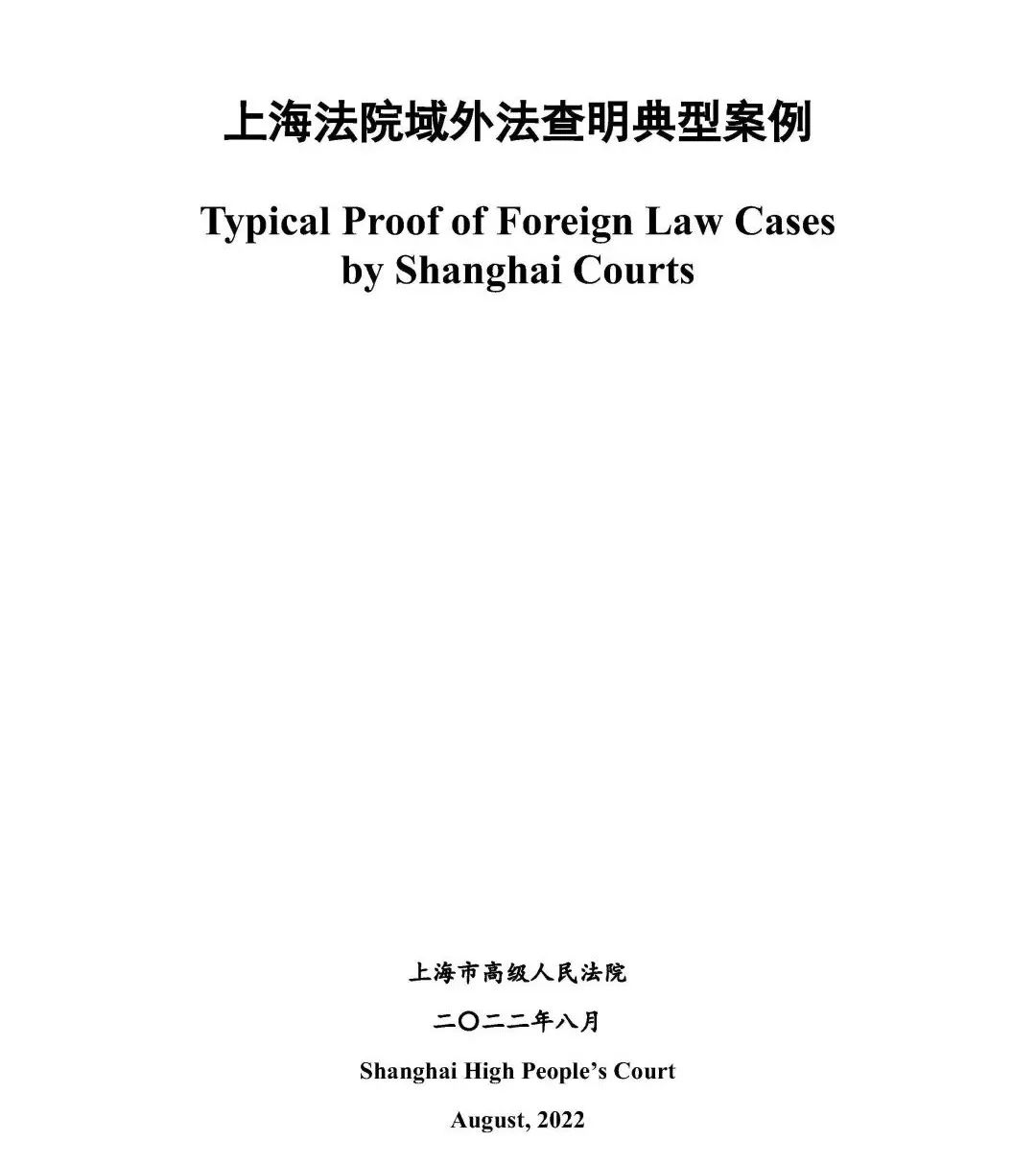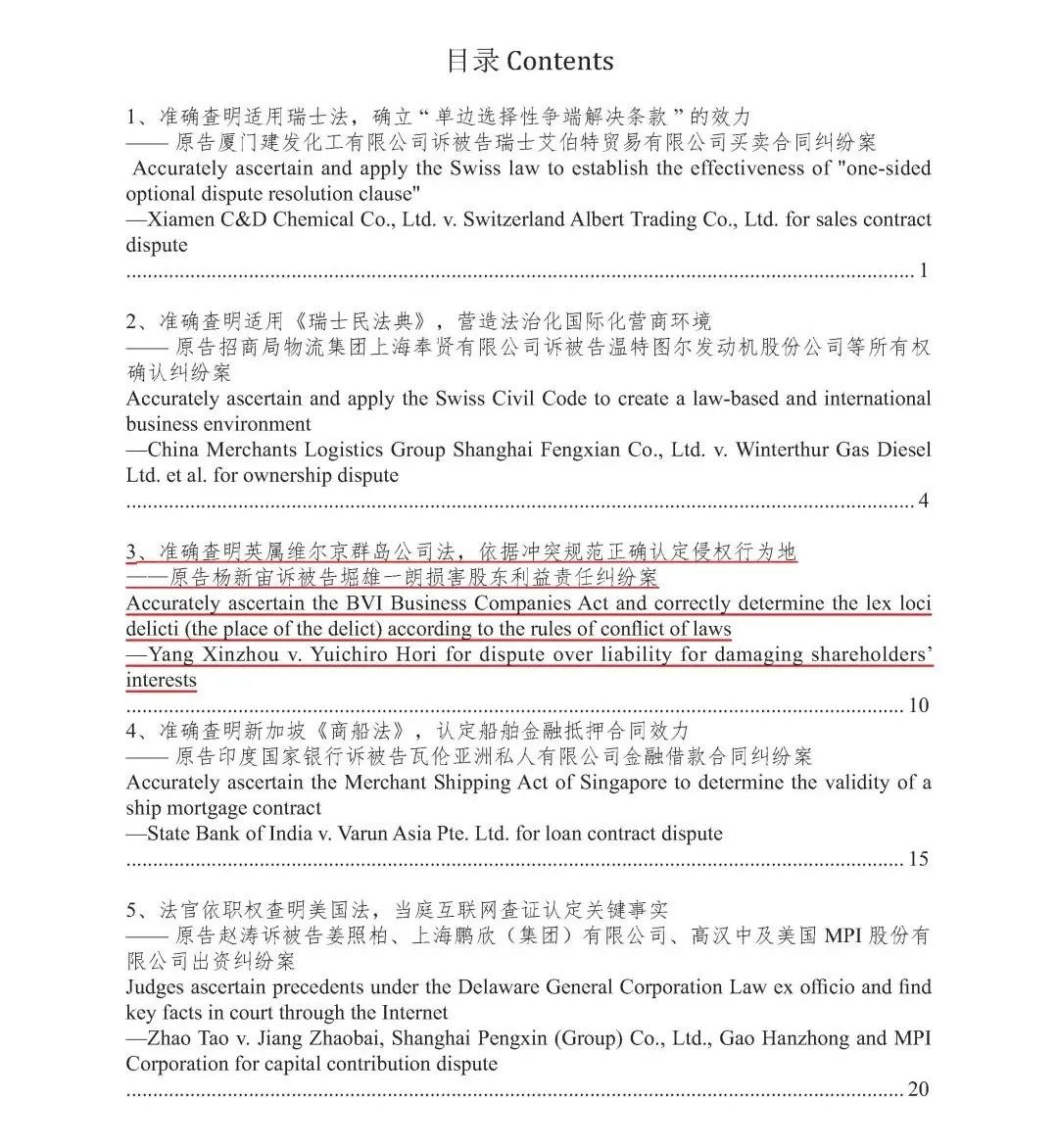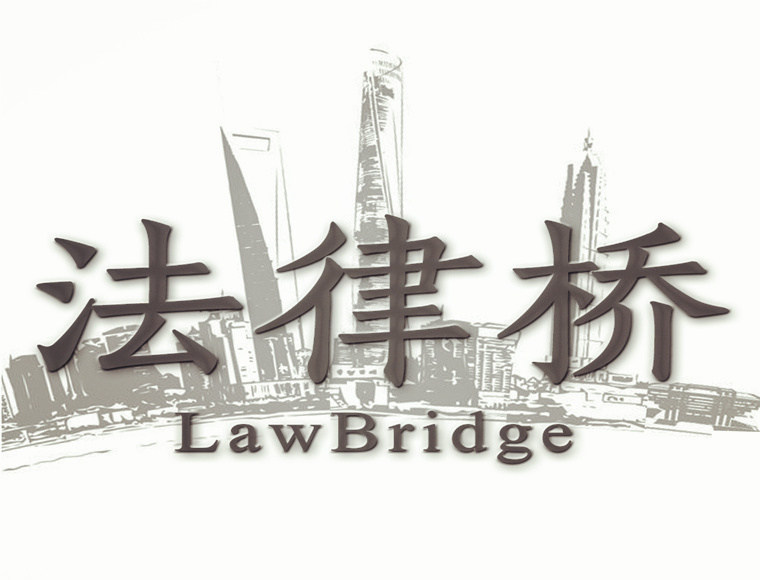The case represented by Yang Chunbao's lawyer team was selected into the Typical Case of Shanghai Court's Investigation of Foreign Law
Recently, the Shanghai Higher People's Court held a press conference to release the White Paper of Shanghai Higher People's Court on Foreign related, Hong Kong, Macao and Taiwan related Commercial Trials (2017-2021), and the White Paper of Shanghai Foreign related Commercial Trials on Foreign Law Identification (2015-2021) and typical cases for the first time. The Shanghai High Court has released nine typical cases of ascertaining extraterritorial laws, covering the achievements of ascertaining and applying extraterritorial laws of the United States, Singapore, Switzerland, Japan, China's Hong Kong Special Administrative Region, the British Virgin Islands and other countries in Shanghai's foreign-related, Hong Kong, Macao and Taiwan related commercial trials in recent years.
The case of Yang Xinzhou, the plaintiff represented by lawyer Yang Chunbao and Han Huihuo, suing the defendant Horie Xiongyilang for the responsibility of damaging the interests of shareholders, was included in the Typical Case of Shanghai Court's Extraterritorial Law Identification (the full text of the case is attached below). After more than eight years of first and second trials, retrial of first, second and retrial, the case finally received full support from the plaintiff Yang Xinzhou. For details about the tortuous litigation process of this case and our agency ideas, please refer to the First Case of BVI Company Directors' Damage to Shareholders' Interests in Chinese Courts, which you can also watch on Station B: https://www.bilibili.com/video/BV18Z4y1i7EE/?spm_id_from=333.999.0.0
At this press conference, the Shanghai High Court for the first time released the White Paper on Ascertainment of Extraterritorial Laws in Shanghai's Foreign related Commercial Trials (2015-2021) and typical cases, sorting out the ascertainment of extraterritorial laws by Shanghai courts in the past seven years and the effectiveness of relevant mechanism construction.

The press conference reported that the court needs to find out the content of the extraterritorial law through certain ways and means when hearing the commercial cases involving foreign affairs, Hong Kong, Macao and Taiwan, if the parties agree to choose a certain extraterritorial law or determine the application of extraterritorial law according to the norms of conflict of laws. Whether the extraterritorial law can be identified and correctly applied directly affects the determination of the substantive rights and obligations of the parties and the final outcome of the case. Due to the complexity and difficulty in understanding the extraterritorial law, it has become a "bottleneck" problem that restricts the efficiency of commercial trials involving foreign affairs, Hong Kong, Macao and Taiwan for a long time.
Since 2015, Shanghai courts have generally shown the following five characteristics in identifying cases involving foreign affairs, Hong Kong, Macao and Taiwan:
First, the causes of action are widely distributed, and the laws identified tend to be refined and complex, reflecting the full participation of foreign-related, Hong Kong, Macao and Taiwan related commercial subjects in Shanghai's investment, finance, trade and other fields. The judicial demand for applying extraterritorial laws in foreign-related, Hong Kong, Macao and Taiwan related commercial trials is growing.
The second is to broaden the ways of ascertainment, and the ways of ascertainment reflect cooperation and diversification. In practice, there are both ways for judges to use the Internet platform to inquire about extraterritorial laws in court, and also ways for parties to provide extraterritorial laws according to reasonable ways such as publishing legal academic books publicly and domestic effective judicial documents.
The third is that the subject of investigation is statutory, the parties' provision is combined with the court's investigation, and the Shanghai court's investigation of extraterritorial commercial cases involving foreign affairs, Hong Kong, Macao and Taiwan can be subdivided into direct investigation of the parties, expert investigation entrusted by the parties, expert investigation entrusted by the court, and direct investigation by the judge.
Fourth, the results of investigation are diverse, which are reflected in written laws and extraterritorial precedents. The survey samples selected from the investigation cases show that the demand for investigation of extraterritorial written laws accounts for 68.1%; The demand for case investigation accounted for 25.23%, and the investigation of procedural matters such as litigation costs and arbitration accounted for 4.7%; The identification of international treaties and practices accounted for 1.97%.
Fifthly, experts and service agencies play an important role in ascertaining the expertise of personnel. When the parties have different understandings of extraterritorial laws, the court entrusted experts to investigate extraterritorial laws to supplement the investigation of extraterritorial laws in the form of expert opinions, providing strong support for the accurate application of laws in foreign-related, Hong Kong, Macao and Taiwan related commercial cases. By the end of 2021, the Foreign Law Identification Research Center of East China University of Political Science and Law had accepted the entrustment of the Shanghai Court to identify more than 20 cases.

The following is the full text of the case of the Plaintiff Yang Xinzhou v. the Defendant Horie Xiong Yilang on the Liability Dispute for Damage to Shareholders' Interests:
III. Accurately ascertain the BVI Business Companies Act and correctly determine the lex loci delicti (the place of the delict) according to the rules of conflict of laws
—Yang Xinzhou v. Yuichiro Hori for dispute over liability for damaging shareholders’ interests
[Basic Facts]
This case is about the dispute over liability for damaging shareholders’ interests. In 2013, Stellarworks Holding Ltd. (SW Holding Company) was incorporated in the British Virgin Islands, with two shareholders: Yuichiro Hori and Yang Xinzhou, each holding 70% and 30% equity. Yuichiro Hori was appointed as the director. SW Holding Company was a wholly-owned shareholder of Stellarworks Investment Ltd. (SW Investment Company), which was a wholly-owned shareholder of Fuxun International Trade Co., Ltd. (Fuxun Company). In March 2014, Stellarworks International Ltd. (SW International Company) was incorporated in the British Virgin Islands, with one shareholder: Yuichiro Hori, holding 100% equity. SW Holding Company intended to transfer all its shares in SW Investment Company to SW International Company, and evaluated the assets of Hong Kong Fuxun Company, the only substantive asset of SW Investment Company. During the evaluation, Yuichiro Hori made several suggestions to the evaluation company. As the sole director of SW Holding Company, Yuichiro Hori then approved the Share Transfer Agreement. Yang Xinzhou believed that Yuichiro Hori, as the majority shareholder and the only director of SW Holding Company, deliberately lowered the evaluation price when transferring the company’s assets to another company under his name, damaging the interests of the minority shareholder Yang Xinzhou, and therefore Yang Xinzhou claimed against Yuichiro Hori for compensation.
[Court Ruling]
Minhang District Primary People's Court of Shanghai Municipality found that Yuichiro Hori was a citizen of Japan, and Yang Xinzhou claimed compensation against Yuichiro Hori on the grounds that Yuichiro Hori infringed upon Yang Xinzhou’s shareholders’ rights in the execution of SW Holding Company’s affairs. This case is a foreign-related infringement dispute, which should be governed by the law determined by Article 44 of the Law of the People's Republic of China on the Application of Law on Foreign-related Civil Relations. The liabilities for delict in this case should be governed by the lex loci delicti commissi, i.e., the law of the place where the delict was committed. Given the delict claimed by Yang Xinzhou was an equity transfer, the place where the equity was located, i.e., the place where SW Investment Company was domiciled, shall be the place where the direct result of the delict occurred. Therefore, the place of delict shall be the domicile of SW Investment Company, i.e., the British Virgin Islands; the law of the British Virgin Islands shall apply to this case. Considering the provisions of the ascertained law and the lawyer’s legal opinions, the Minhang District Primary People's Court of Shanghai Municipality held that according to the laws of the British Virgin Islands, if Yang Xinzhou’s rights as a shareholder of the SW Holding Company were damaged due to the unfair execution of the SW Holding Company’s affairs by Yuichiro Hori, Yang Xinzhou had the right to claim against Yuichiro Hori.
Yuichiro Hori filed an appeal, requesting the law of the People’s Republic of China, i.e., the common habitual residence of both parties, be applied in this case.
The Shanghai First Intermediate People's Court held that, such evidence as foreigner work permit provided by Yuichiro Hori was insufficient to prove that his habitual residence was within the territory of the People’s Republic of China. The concept of "place of domicile" in the determination of case jurisdiction is not the same as that of "place of habitual residence" in the above-mentioned legal provisions. Therefore, it is not improper for the court of first instance to apply the lex loci delicti commissi, i.e., the law of the British Virgin Islands.
[Typical Significance]
This case concerns the application of law for company-related delict. The delict occurred in the British Virgin Islands. However, according to the relevant provisions on the application of law in delict cases, if the parties concerned have a common habitual residence, the law of common habitual residence shall apply. One of the disputed issues in this case is whether both parties take Shanghai as their common habitual residence? Should the law of the British Virgin Islands or the law of China be applied in this case? Yuichiro Hori provided evidence that he had real estate and worked in Shanghai, but the entry-exit records showed that he frequently traveled between Japan and Shanghai during the occurrence of the delict. Therefore, the court found that his evidence was insufficient to prove that his habitual residence was Shanghai. The court finally ascertained the relevant laws of the British Virgin Islands and rendered a judgment according to the legal provisions on the official website of the British Virgin Islands, the translation submitted by Yang Xinzhou and the legal opinion issued by the local lawyer entrusted by Yang Xinzhou. This case is of great reference value for the application of law and the finding of delict in similar cases.
























































First, please LoginComment After ~